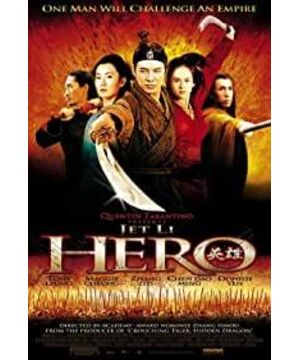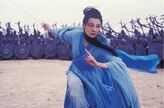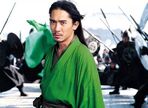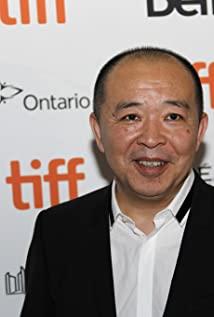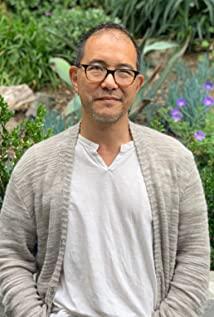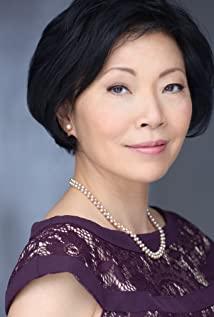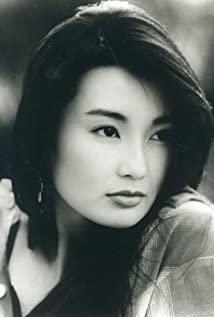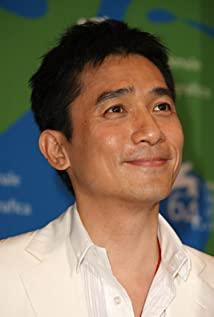"Hero" not only opened the prelude to a Chinese commercial blockbuster, but also set a milestone in the integration of Chinese history and culture into film art. The art in "Hero" is not only the wonderful interpretation of Maggie Cheung, Tony Leung, Jet Li, Zhang Ziyi, and Chen Daoming, but also from Tan Dun's wonderful background music configuration. The theme song "For the World" (for the world) is a classic. More artistic conception is expressed in the calligraphy of Zhao State, the arrow formation of Qin State, the quicksand of Gobi, the yellow leaves dancing in the sky during the battle between Maggie Cheung and Zhang Ziyi, and the drop of water bounced by Wuming and Can Jian Lingbo when he walked slightly... …
I watched "Hero" for the first time after the college entrance examination in 2003. I appreciated its grand scene and superb skills; I watched "Hero" in an undergraduate course, feeling the love of its children, the beauty of the soundtrack, and the superposition of the plot of triple guessing. Today, I watched "Hero" again, but how many strange ideas came up, and there were more historical and political thinking about the plot?
1. Can Jianyu Feixue: Why can't King Qin kill?
From today's point of view, Canjian, Feixue, Changkong, and Wuming are all political dissidents. Qin destroyed the six kingdoms, and Feixue was the daughter of Zhao Zhen, the general of the State of Zhao. Zhao Zhen died in the battle of Qin and Zhao. The Remnant Sword, the Sky, and Wuming also had the hatred of murder and subjugation against Qin. Assassinating Qin became a very appealing and revolutionary legal measure to stop Qin from destroying the six countries and revenge. The common enemy brought together Remnant Sword, Feixue, Longkong, and Wuming, laying the foundation for the alliance. However, the reasons for the four assassination of Qin are different. Feixue and Wuming are the enemies of killing relatives, the sky is the way of chivalry, and the broken sword is the hatred of subjugation. To a certain extent, it affected their revolutionary enthusiasm and Assassin's final choice.
Feixue and Canjian represent two typical factions of dissidents: radicals and moderates. The radicals are determined to assassinate Qin to the death and hate the country with the snow. They simply think that as long as King Qin is killed, all problems will be solved, the world will be peaceful and the people will be well. Even the radicals never thought about the people and the world. Their purpose is to assassinate Qin, the purpose is simple, as for the assassination of Qin, it has nothing to do with me; while the moderates, thinking about the world and the common people, put their hope on the king of Qin, and hope that after he is in power, they will be kind to the people. The resistance of the moderates is limited to, Give warnings and pressure to those in power to discipline and soften the "violence" of the rulers.
"Why can't King Qin kill?" Can Jian wrote two words "Tianxia" to Wuming. Can Jian and others had two opportunities to succeed in assassinating Qin, but they all failed. For the first time, Feixue and Can Jian were "sufficient for ten years", and the second time all four knights returned to Huangquan. If the revolution fails, so is the fate. There is nothing to say. However, the reason given by Can Jian is enough to make people think, "The seven countries have been fighting for years, and the people have suffered. Only King Qin can stop the war and dominate the world; the pain of a person is no longer pain when compared with the people of the world. The hatred of the Qin State is no longer hatred in the world." Can Jian knows that killing King Qin will not be better, but will only get worse; King Qin will not die, the people will suffer, and the people will die, and the people will suffer even more.
"Stop the war and unify the world" is the core view of "Hero", which contains the Chinese people's urgent demand for "order". In order to avoid war, we can endure the rule of a tyrant, even if we suffer the hatred of subjugation. In order to order, one must endure the "necessary evil" of King Qin, and endure a "Leviathan". As for the pursuit of equality, freedom, and rights, the scope is no longer considered. From a modern point of view, "Hero" is more like a political propaganda film, which embodies the infinite imagination of modern Chinese people about the enlightened monarchy...
2. Why did King Qin finally "reluctantly" shoot the nameless?
Wuming finally gave up the assassination of King Qin for the sake of "Tianxia", but King Qin finally ordered "Wuming" to be shot and finally chose "Thick Burial" to make up for his own conscience. In the past, it was thought that King Qin killed Wuming because he was concerned about the pressure of Da Qin laws and subordinate officials. If he did not kill Wuming, it would be detrimental to Da Qin's majesty. Of course this is reasonable, but from the perspective of governance, Wuming absolutely cannot allow him to leave the Qin Palace safe and sound.
The core element of modern politics lies in the nationalization of "dispersed violence", and the state must monopolize the use of violence. Even if militants like Wuming do not directly threaten the rule, they still represent the existence of a kind of alien political force, which is a potential threat to the political authorities and must be killed and sickened. Chinese politics often adopts a zero-tolerance policy for "dissidents". Either you die or I die. If you can't assimilate you ideologically, you must be eliminated physically.
Therefore, even though he had "cherished the scholars" and thought of "the grace of not killing", King Qin ordered the killing of "Wu Ming". Unknown death is extremely normal in the history of China's political revolution, and it verifies the wisdom of "unsuccessful, benevolent". If Remnant Sword and Feixue are not dead, maybe they will still be wanted. On the surface, the abandonment of armed forces in the sky is to commemorate the dead friends, but the essence should be that the country cannot tolerate "violent dispersion."
3. Why must Can Jian die by Feixue? The
revolution failed, and Feixue asked Can Jian Xingshi. In Feixue's view, Can Jian not only betrayed the revolution in his own behavior, but also disintegrated the revolutionary alliance front ideologically, misled the nameless in the name of "Tian Xia," thereby delaying the revolution. The radicals inevitably attributed the failure of the revolution to the "compromise" and "rebellion" of the moderates. Moderates and radicals have also been in love with each other, but the difference based on the judgment of the general situation is unavoidable, and love grows hatred.
The moderates always hope that the radicals can understand their painstaking efforts, but the Chinese hate traitors more than their enemies, and pray for understanding. The difficulty is as great as heaven. However, the moderates do not belong to the rulers psychologically. They have blood relatives with the radicals. A person is not afraid that people in the world will not understand oneself, and people in the world will not be afraid of insulting oneself, but when one is afraid that the person he loves will misunderstand oneself, he is like a stranger and treats himself as an enemy.
"How do you believe it?" This is what Can Jian most wants to answer to Feixue. Can Jian's death was just to make Feixue aware of her innocence, and the tragic death can exchange the trust in the past, and only by death can Feixue understand herself. To live, it proves that you have your own interests. When you die, it means you don’t covet anything. When you die, everything is self-evident. It is harder to let another person understand oneself than to climb to the sky. There is a saying in China that the so-called "immortality is not enough for civilians to indignation." In order to quell Feixue's hatred, Remnant Sword must die, and must die under Feixue Sword. There is also a saying in China that it is better to die than to live. The Chinese have never thought about the meaning of “death”. Killing and getting righteous is a last resort, and living is better than anything else. It can be seen that Can Jian deeply understands from his heart that the hatred in Feixue's heart is too deep and can only be washed away by blood. Death is an explanation. Can Jian said, "So you believe it."
4. Why did Feixue scold Canjian: "You only know the world"?
According to the way of writing Chinese history, the individual is not worth mentioning in the long river of history, it is a wave or a drop of water. "Tian Xia" is a nihilistic concept in Feixue's eyes. What is Tian Xia? Isn't the world made up of every individual? Shouldn't individual hatred be extended? For Zhao Guo, Zhao Guo is her "world", and her father is her "world".
In the name of "the world", how many common people have been sacrificed. Years of wars have caused disastrous life. Taking a step back, why sacrifice one's own interests for the sake of "the world"? Why can we tolerate a "tyrant" for the sake of "the world"? Can someone else’s country be destroyed for the sake of the world? Who gave you the right to unite the world with violence?
Can Jian's "world view" is very different from Feixue's "world view". "You only know the world?", a single sentence expressed Feixue's great doubts and puzzles. In the tide of history, do ordinary individuals’ sorrows and joys, love and hatred, and hatred have any meaning in the end? There is no basis for "legitimacy" in a woman's family, country, world, and revenge for the father has a sufficient reason to act in a certain sense. Therefore, the "world" of Can Jian completely hurt a woman's heart. Can Jian's "world view" has the same moral basis as the "universal value" promoted by the United States in warfare, and it is the same as many unscrupulous policies promoted in the name of "tianxia" in many countries.
In political philosophy, there is a special topic discussing "moral relativism". Everyone has his own "morality." Everyone's morality should not be imposed on others, nor can it be used to decide which morality is good on behalf of others. Fei Xue and Can Jian's understanding of Assassin Qin is based on different moral concepts. Fundamentally speaking, there is no right or wrong, but only the choice of reference system. Perhaps moral relativism will be the eternal dilemma of mankind. We can never reach enough eternal "consensus". The so-called greatest hatred comes from the conflict of "ethics" that everyone takes for granted. Rawls's solution is "overlapping consensus", which resorts to public opinion debate and rational reflection, but it is basically a fantasy, and consensus is basically difficult to reach.
Moral relativism will accompany us like a shadow. This is the fate of mankind, and the result is that Feixue killed the Remnant Sword.
The only hope lies in the original wish of Can Jian and Feixue: "When Assassin Qin's wish is fulfilled, I will take me back to her home. There are no swords and no swordsmen there." Everyone is looking forward to such a "utopia". , I wonder if there will be in this world? There is no intrigue, no intrigue, no killing and snatching, "no sword, no swordsman"? It's just that Remnant Sword and Feixue have not been able to wait for the arrival of "utopia" in the world. Before Feixue's death, the last sentence "I will take you home now and return to our home?" Is this fate?
Attached: "Hero" background music
1. Hero: Overture Cang: Overture 2. For
The World-Theme Music World: Hero theme
3. Above Water
4. Hero (Theme Song)
-Faye Wong 5. At Emperor's Palace Chong Qin Palace
6. Fareweall, Hero hero funeral
7. Gone With Leaves Gone with the Wind: Populus euphratica
8. In The Chess Court Chess Court Guqin
9.Longing 10.Love
In Distance
11.Snow
12.Sorrow In Desert
13.Spirit Fight
14.Swift Sword
15.Take Me Home
16.Warriors Wind
17.Yearning For The Peace
View more about Hero reviews


